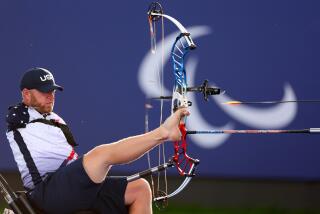Let the Fencing Medal Talk Begin
- Share via
NEW YORK — This might be the only time Keeth Smart has felt awkward on a fencing strip.
He’s standing on one in a room at the Fencers Club in Manhattan trying to record a quick promo for a cable TV channel. It is not going well. The director asks him to try it again. More natural this time, he urges.
Take two.
Take three.
“Some people just have a born gift for certain actions,” said former Olympian Peter Westbrook, who has been a mentor to Smart for more than a decade. He was, of course, talking about Smart’s ability with a saber -- not necessarily a microphone.
This August in Athens, Smart will compete in his second Olympics. And he’s looking for a finish higher than his 30th-place result at the Sydney Games four years ago.
He can become the first American medalist in the sport since 1984, when Westbrook won bronze in Los Angeles.
“He has a born gift for a long graceful attack the way his body is made, the way his nervous system is structured,” Westbrook said.
Keeth is “like Tiger Woods. I’m sure he trains hard, I’m sure he worked hard, but I’m sure he’s just born with something that makes him a little better.
“That’s what Keeth is like.”
Smart isn’t the only American who stands a good chance at a medal. He’ll head up what could be one of the most competitive U.S. teams ever. In saber -- Smart’s discipline -- all three American Olympians are ranked in the world’s top 30.
“It’s a completely different team than in 2000,” Smart said. Teammates are “putting their lives on hold, taking leave from work, taking time off of school.”
Smart, a two-time U.S. champion, in 2002 and 2004, has competed on every U.S. team at the world championships since 1997. He’s won two World Cup competitions and won two NCAA titles at St. John’s.
But what really captured people’s attention was when he became the first American fencer ranked No. 1 in the world last March. It was an important milestone in a sport traditionally dominated by Europeans.
Not too long after Smart first started competing, he began to notice that other athletes were making a point of attending his matches, sometimes recording them with video cameras. Top fencing officials from other countries came to watch, too.
“He said, ‘Dad, these people are following me around over there. They’re using camcorders on me,’ ” recalled Smart’s father, Thomas. “Unbeknownst to him, it was getting to the point that they were saying, ‘Who is this upstart kid from Brooklyn learning our sport?’ ”
More to Read
Go beyond the scoreboard
Get the latest on L.A.'s teams in the daily Sports Report newsletter.
You may occasionally receive promotional content from the Los Angeles Times.






